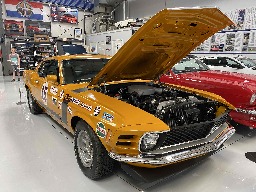Boss 302


Last year I went to the Mustang Owners museum in North Carolina. All of the mustangs there are either the museum owners personal stock, or lent by mustang owners around the US. Stock changes every 6 months or so and they even have one of the oldest (by VIN that weren’t showcase preproduction) mustangs as a “barn find”. 
The people that run it are obviously knowledgeable and were a blast to talk to. When I went they mentioned that they were trying to acquire the full scale clay S550 model. It’s possible that it would have been the one that was used in the documentary “A Faster Horse”.
You are viewing a single comment
Forgot to mention, this one is a 1970. So it’s got a little more fat to it.
Fun fact, pre-malaise era cars were massively underrated on power. Some manufacturers (on these semi race spec cars) quoted half the power they actually made just so they’d be able to sell for stock car homologation.
I read an article in like 2011 where a group of engine builders rebuilt to factory spec and dyno tested the big 3's performance motors, each one of them produced over 700hp, not the ~350 they claimed haha. I wish I could find the article now, it was a great read.
I reckon they could only run with that claim as long as the tires of the time were still crappy! Now imagine any of the Big 3's big hitters on some brand new Pilot Cup tires - my god.
Underrating cars is still very much a thing.
In the 90’s is was the Japanese “Gentleman’s Agreement” that no car made over 276PS. The Supra TT and GT-R both made 276 on paper but would routinely put down 350+.
VW does it now. My MK7 GTI is rated at 220hp, 258tq at the crank, but it puts 230hp/270tq to the wheels.
It’s mostly an insurance thing.
I remember that article! I’m fairly certain it was Engine Labs.
The biggest way they cheated on these cars was rating them to stupid low rpm’s. Like Chrysler rated the Road Runner “peak power” at like 4300rpms.